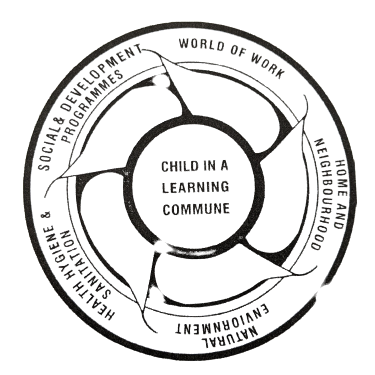Download B.Ed. Prospectus
GANDHI SHIKSHAN BHAVAN Under the Management of INDIAN COUNCIL OF BASIC EDUCATION
The Statement of Objective
Those who join Gandhi Shikshan Bhavan either as Teachers, Students or Field Workers, have an opportunity to learn new ideas about Life and Education. GSB attempts to stimulate them to think rather than accept Fixed Practices. Students and Teachers are exposed to Ideas, Approaches and experiences that enable them to grow as individual Personalities.
In 1937, Mahatma Gandhi announces certain proposals for radical re-orientation of education policy in India. Out of the public debate, they generated there has grown a body of education theory and practice that goes by the name of Basic Education. A group of teachers in Mumbai and elsewhere in the country interested in the theory and practice of Basic Education formed and association in 1963. Indian Council of Basic education and got it registered under the Bombay Public Charities Trust Act of 1950. Its purposes have been:
- To examine, Interpret and propagate the ideology and methods of Basic Education in both rural and urban areas.
- To organise discussion, study and research in Basic Education.
- To produce relevant literature.
- To establish, conduct and aids schools and colleges of Basic Education in Mumbai and/or any other part of the country.
- To work in co-operation with similar institutions.
The Council established an institute of education under the name of Gandhi Shikshan Bhavan and inaugurated it on 2nd October, 1969, the birth centenary of Gandhiji. It is now called GSB’s Smt. Surajba College of Education. Besides training student-teachers for B.Ed., M.Ed., and Ph.D., girls are also educated to be Teachers at Pre-Primary level (Diploma in E.C.Ed.).
Gandhi Shikshan Bhavan has a campus of more than an acre and a half of land on the north-end of Juhu.
ACTIVITIES AND PROGRAMMES
- College of education affiliated to the University of Mumbai.
- Diploma in Early Childhood Education.
- Research in Education
- Ph.D. Research Cell affiliated to Mumbai University.
- M.Ed. through Yashawantrao Chavan Maharashtra Open University.
- Inservice and extension work in schools.
- Pre-school, Primary school and Secondary School.
- Community Education.
- Women’s cultural and Development Centre.
- Dance Class and Yoga class.
- Theatre Workshop
- Publication of journals and books.
- Publication of Research journal (Quest in Education)
- Programmes for promotion of Khadi and handicrafts.
College of Education: A Few unique Features
- Integration of teacher education with community education
- Teacher education covers all the aspects of a teacher’s personal, social and professional development.
- Study of theory organized through seminars, tutorials and discussions.
- Practice-teaching based on improvement of school education and innovativeness in content, methodology and evaluation procedure.
- Personal rapport between the faculty and the students.
COMMUNITY WORK
The students work in the following centers for three hours a week :
- Cheshire Home, Andheri (East)
- Industrial Home for Blind Women, Andheri (West)
- Mobile Creche at Juhu
- Municipal Schools
- Asha Kiran Foundation – education of Street Children.
Development of a well-integrated personality is possible if :
- Educational experiences and work experiences interweave, intersect and reinforce each other.
- Students and Teachers participate actively in the community services such as adult education, promotion of better health, hygiene and sanitation etc.
- Curriculum provides for self-directed learning.
- Education concerns itself with the development of the whole human kind.
OUR CURRICULUM
- Workshops
- Seminars
- Panel Discussions
- Open discussions
- Celebrations
- Exhibitions
- Learning through Films
- Visits
- Expert talks
- Debates
- Community Work
- Camps
- SUPW
GANDHIAN PHILOSOPHY BASED REGULAR PROGRAMMES
- Sarva Dharma Prarthana
- Sarvodaya Patra
- Visit to Mani Bhavan – Gandhi Sangrahalaya
- Presentation of ‘My Experiments with Truth’ to all students
- Presentation of anecdotes from ‘My Experiments with Truth’ to our students in our practice teaching schools
- Papers on Gandhian ideology by teachers and students
- Seminars on Gandhian thoughts
- Community lunch programmes for all students and staff 9. Khadi Exhibition
- Visit to Handloom and Handicraft Fairs
- Regular Socially Useful Productive Work
- Regular Community Service Programme
- Gandhi Jayanti Celebrations
- Gandhi Punyatithi
- Rural Camp for four days
- Interaction with eminent Gandhians
- Workshops on Poster making Gandhian Quotes
- Display of Gandhian Quotes
- Gandhian Theme based Exhibitions:
- Songs based on Ahimsa, Love, Co-operation, Secularism, National Integration etc.
- Tying of Peace Bands
“By education I mean, an all-round drawing out of the best in child and man – body, mind and spirit”.
-Mahatma Gandhi
Vision of the Institution
To provide quality education for empowerment and enlightenment through Gandhian philosophy to prepare socially committed teachers.
Mission of the institution
Nurturance and dissemination of Gandhian values to develop innovative, involved and dynamic teachers for the welfare of society.
Our Motto
‘Learning to teach and teaching to learn’
Goals of the Institution
To make teaching & learning an enjoyable experience.
To create teachers with well-integrated personality.
To prepare teachers as agents of social change.
To ensure harmonious development of teachers for a peaceful society.
To develop research skills among teachers
To make greater use of information and communication technology in order to prepare teachers and students for globalized world.
To create a passion for life-long learning amongst students and teachers
“The Destiny of India is being shaped in the classrooms of India”.
– Education Commission 1964-66
QUALITY
QUALITY IS NEVER AN ACCIDENT,
IT IS ALWAYS THE RESULT OF HIGH INTENTION, SINCERE EFFORT, INTELLIGENT DIRECTION AND SKILLFUL EXECUTION……
IT REPRESENTS THE WISE CHOICE OF MANY ALTERNATIVES.
GANDHI SHIKSHAN BHAVAN
Functional Educational

.
